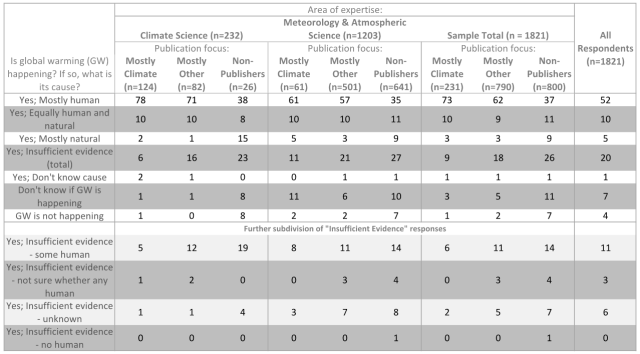
The Daily Caller reported that a new survey of meteorologists contradicts the scientific consensus on climate change. But a simple opinion survey does not debunk that 97 percent of climate science papers found that human activities contribute to global warming -- rather, it only shows the stark differences between climate science research and meteorologists' beliefs.
A recent study conducted by the American Meteorological Society (AMS) surveyed its “professional members” to test how political ideologies and climate expertise influence opinions on manmade global warming. The study found that only 52 percent of its members believe global warming is happening and is caused mostly by humans. However, this study merely shows that the average opinions of meteorologists are at odds with the majority of scientific research on climate change, and does not, as the Daily Caller claimed, show that “there is much more disagreement among climate scientists than previously thought”:
Not all scientists agree that global warming is man-made. Nearly half of meteorologists and atmospheric science experts don't believe that human activities are the driving force behind global warming, according to a survey by the American Meteorological Society.
[...]
This new AMS survey runs counter to the notion of a “97 percent” scientific consensus and shows that there is much more disagreement among climate scientists than previously thought. The 97 percent number came from a survey of published environmental papers written by scientists from around the world, while the AMS survey measured U.S.-based scientists.
This is not the first time that meteorologists and climate scientists have been at odds. A previous survey of TV weather forecasters found that 27 percent of respondents believed that "global warming is a scam," and more recent survey found that over half of TV forecasters don't believe in manmade climate change.
There are vast differences between meteorologists and climate change scientists, not limited to that their models are different and they ask different questions. Kerry Emanuel, an atmospheric scientist at the Massachusetts Institute of Technology, explained in an email to Media Matters why a weather forecaster like Joe Bastardi should not be featured in the media to discuss climate change:
I might point out that Bastardi's background is in weather forecasting, not climate science. Asking him to comment on the science of climate change is rather like asking a country doctor to comment on the latest developments in biomedical research. The media really ought to know better.
The AMS itself has criticized broadcasters for offering “nonscientific” opinions on climate change:
Increasing numbers of broadcast meteorologists, to whom the public looks for information and guidance on climate change and global warming, are not offering scientific information but rather, all too often, nonscientific personal opinions in the media, including personal blogs. Alarmingly, many weathercasters and certified broadcast meteorologists dismiss, in most cases without any sold scientific arguments, the conclusions of the National Research Council (NRC), Intergovernmental Panel on Climate Change (IPCC), and other peer-reviewed research."
[...]
The expertise of scientists actively researching climate change is well beyond that of most professional meteorologists, some of whom may only have basic training in weather analysis and forecasting. Nonetheless, the public sees media meteorologists as experts.
The antagonism between climate scientists and meteorologists is illustrated within the AMS survey itself; of the survey respondents with expertise in climate science and who actively publish on climate-related issues, 88 percent believe that humans play a major role in perpetuating global warming, and only 1 percent believe that global warming is not happening.
AMS members are defined simply as “persons having demonstrable professional or scholarly expertise in the atmospheric or related sciences, technologies, applications, or services whether or not this expertise is a source of livelihood.” This does not even necessarily mean scientists, which has profound implications in the AMS survey's results: Throughout every area of expertise, the percentage of those who believe humans cause global warming dropped significantly among the respondents who have not published scientific literature in the last five years, down to 37 percent.
The AMS study is just the latest opinion survey that has surfaced and been seized on by the right wing media to cast doubt global warming. Hopefully, mainstream media will hesitate before further amplifying this meteorologist opinion survey to attempt to contradict the overwhelming consensus on climate change.
UPDATE (12/2/13): The authors of the AMS survey criticized “selective reporting” of their results that “misled” some readers on Thursday. They specifically cited James Taylor of the Heartland Institute, an organization that promotes climate misinformation, who claimed that the survey "[d]estroys" the consensus in a blog at Forbes even though the survey found that 93 percent of climate experts accept manmade climate change.
The American Meteorological Society also rebuked the Heartland Institute for sending an email that tried to make it “appear to have been sent by AMS” including sending the email blast from an address with AMS in the name, saying the email was “disturbing.”
